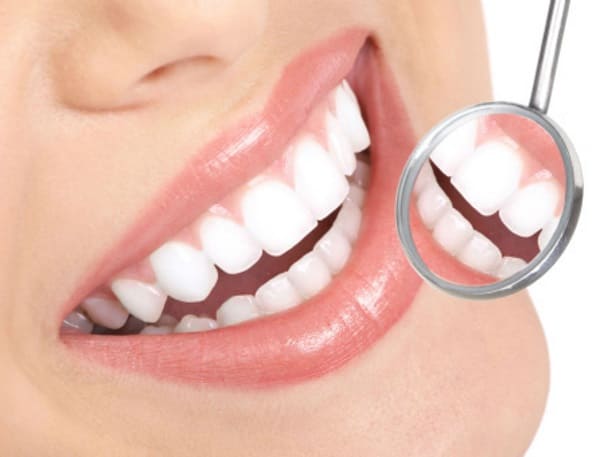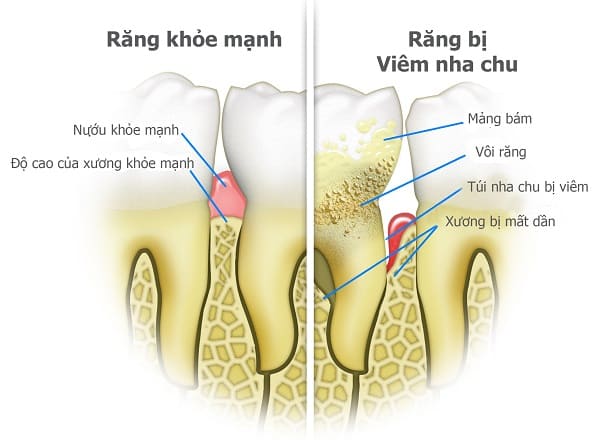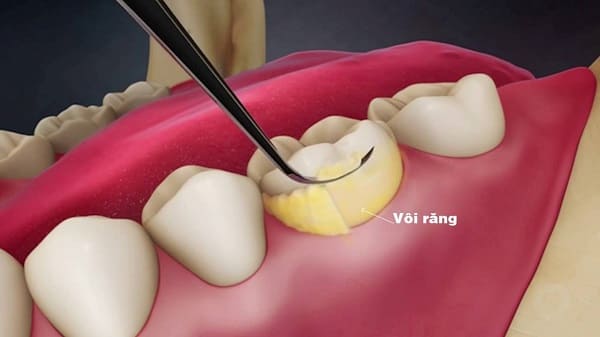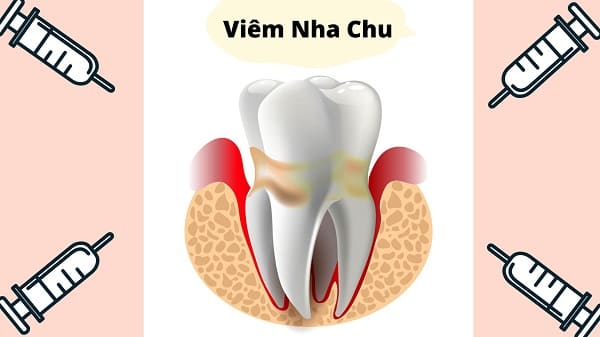What is periodontitis? Causes, symptoms, diagnosis and treatment direction
Periodontitis is a fairly common oral disease, but because the disease has similar characteristics to gingivitis, it is often confused. If not treated early, periodontal disease will greatly affect the ability to eat and chew and lead to many other dangerous complications. So what is periodontitis? Please join Dr.Muoi to learn about the causes and symptoms of this disease through the following article.
1.What is periodontal? What is periodontal disease?
What is periodontal? Periodontal is the organization around the teeth including: gums, alveolar bone, ligaments, gums and gum spines. Periodontal functions support and help keep teeth strong.
A strong tooth is a tooth with a gum part that hugs the root of the tooth. This part of the gums is used to protect soft tissue, and prevent bacteria from entering. The alveolar bone and the ligament between the tooth and the jawbone will keep the root of the tooth from being shaken and strong.

Periodontitis is an inflammation of the periodontal tissues, which includes gingivitis and destructive periodontitis. Dental tissues are often painful and swollen when infected.
When this condition persists, the gums are no longer able to attach to the roots of the teeth. This creates a favorable environment for bacteria to easily invade and grow. Then proceed to destroy the alveolar bone, causing inflammation and the formation of periodontal pockets.

If periodontal disease is not treated early, it will seriously affect chewing function. In the long run, the patient will feel uncomfortable, lose confidence in communication activities because of the symptoms of bad breath and severe pain that the disease brings.
In addition, according to the latest research results, periodontal disease is now very common, second only to tooth decay. This is also the cause of tooth loss in people over the age of 40 who are not conscious of oral hygiene.
2.Causes of illness
Without proper oral hygiene, it will create favorable conditions for bacteria to adhere to the teeth – gums, thereby leading to gingivitis.
After a period of time, the plaque will harden and become tartar. At this time, gingivitis has turned severe, entering the stage of severe periodontitis. If the body is tired, the immune system is weak, the disease will progress very quickly.

Bad habits that cause periodontitis:
- There is no sense of proper oral hygiene, leading to the accumulation of plaque and bacteria that cause gingivitis. In the long run, plaque will create tartar; red, swollen inflamed gums; When you brush your teeth or use a toothpick, your teeth will bleed.
- Not regularly going to get tartar as prescribed by the doctor, causing gingivitis.
- Smoking can cause gum tissue damage that is difficult to repair on its own.
- Hormonal disorders in the female body, due to pregnancy, puberty, menopause and monthly menstrual periods. During this time, the gums are very sensitive and susceptible to gingivitis.
- Some diseases such as cancer, HIV, diabetes, leukemia, bacterial infections… weaken the immune system. As a result, patients are at high risk for infections such as periodontal disease and tooth decay.
- Gaps between teeth due to frequent use of large and pointed toothpicks.
3. Symptoms of periodontal disease
Periodontal disease is difficult to detect in the early stages and has a silent progression. In the following stages, the symptoms of the disease can be clearly seen, such as:
- The gums turn dark red, swollen or swollen, if touched, it is easy to bleed.
- Teeth pain, sensitivity, or maybe teeth are loose, displaced, painful and uncomfortable when chewing.
- Gums are not firmly attached to the teeth, soft, causing receding gums.
- Bad breath.

- There is a space between the two teeth.
- Plaque appears between teeth and at the roots.
- Bleeding when brushing teeth
- Plaque and tartar stick to the surface of the teeth, especially the neck area.
- If you press on the gum pocket, you can see fluid or pus coming out.
There is a space between the two teeth.
Plaque appears between teeth and at the roots. There are 2 main types of periodontal disease:
– Gingivitis: Common gingivitis, pubertal gingivitis, developing gingivitis…
– Periodontitis: periodontitis in adolescents, periodontitis in the elderly…
Periodontitis is divided into 4 main stages. Each stage will have different signs and characteristics to distinguish and monitor specifically:
Stage 1: Tartar/tartar forms plaque on teeth
At this stage, harmful bacteria attach to the following places: at the roots, gums and between teeth, plaques called tartar begin to appear. Long-term bacterial plaque will cause gingivitis. The patient will not feel any abnormality.
Stage 2: Inflammation begins to cause gums to swell
In the long term, tartar clings to the roots of the teeth, causing irritation to the gums. When there is an impact on the teeth such as brushing, eating, etc., the gums become swollen, sensitive and easy to bleed.
Stage 3: Formation of periodontal pockets
If left untreated, the infection between the teeth and gums will spread to form a periodontal pocket containing bacteria and pus.
Stage 4: Destruction of alveolar bone and receding gums
At this point, severe periodontitis has come. The bacteria continue to grow stronger in the oral cavity, destroying the alveolar bone. At this time, the teeth will be loose, the gums will recede and are very vulnerable.
Bleeding when brushing teeth
Plaque and tartar stick to the surface of the teeth, especially the neck area.
If you press on the gum pocket, you can see fluid or pus coming out.

5. Methods to prevent periodontitis
5.1 When periodontitis has not yet appeared
– Proper oral hygiene: brush your teeth regularly, use a soft-bristled brush, brush your teeth in a vertical or circular motion (don’t brush horizontally).

– Take care of your teeth by flossing instead of toothpicks, using mouthwash or diluted warm salt water to rinse your mouth.
– Periodic dental examination and early treatment if signs of periodontal disease are detected.
– Eat a nutritious diet, add lots of vegetables and vitamins
– Limit smoking and alcohol
5.2 When you have periodontal disease
When you have gingivitis, you need to be active and brush your teeth more often.
– When the disease is new, take care to follow the doctor’s advice to quickly recover.
– When you have tartar (tartar), see a dentist to remove tartar.
Note:
– If the gums are healthy, the teeth will be strong. Take care of your teeth and gums early to prevent dental diseases.
– Eat lots of fresh fruits and vegetables, drink enough water.
– Keep oral hygiene clean, brush thoroughly and gently, use a soft-bristled toothbrush.
– Use mouthwash to remove bacteria and plaque, effectively prevent periodontitis. Buy pre-mixed products with reputable brands such as Dr.Muoi to avoid not knowing the right salt concentration.
Dr. Salt is a saline solution recommended by dentists and trusted by many families. Mouthwash Dr. Salt is completely made from natural ingredients, contains many mineral salts, … is processed by a professional process, ensuring safety for users. The price is suitable for Vietnamese consumers and is available throughout supermarket systems such as Vinmart, Bach Hoa Xanh and online such as Tiki, Lazada, Shopee.
 Dr.Salt mouthwash helps protect oral health
Dr.Salt mouthwash helps protect oral health
Hope this article helps you know what periodontal disease is as well as experience in detecting periodontitis and how to treat it. Don’t forget to use Dr.Muối. mouthwash to prevent oral diseases and help keep your teeth strong and confident.
You Can Refer To More Articles:
Should I wash my nose with physiological saline?
Instructions for Self-healing Sinusitis with Physiological Salt Water
Tips for Treating Allergic Rhinitis with Physiological Salt Water Simple and Effective
Instructions on how to hydrate with salt water to treat bad breath


 Tiếng Việt
Tiếng Việt